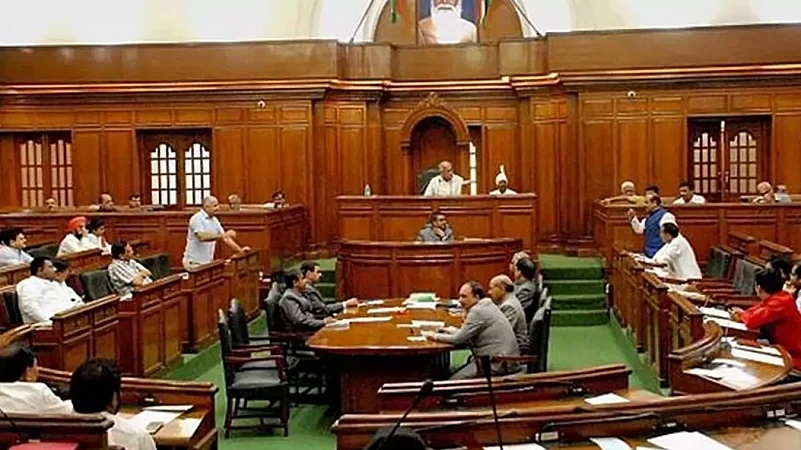Four BJP MLAs were ordered to be marshalled out of the Delhi Assembly by Speaker Ram Niwas Goel on Wednesday following protests in the house over the issue of pollution in Yamuna river.
While BJP MLAs Ajay Mahawar, Anil Bajpai, Mohan Singh Bisht and OP Sharma were ordered to be marshalled out by Goel, the rest of the BJP MLAs decided to boycott the proceedings of the House in protest.
What was the issue?
The BJP MLAs demanded a debate over the issue of pollution but the Speaker refused their request, saying he will not allow any debate under any rule.
The MLAs also submitted samples of Yamuna water in two bottles to the Speaker, who threatened to "terminate the membership of BJP MLAs if the water was found contaminated with acid."
"The LG has paralysed the House and BJP MLAs should be ashamed for it. BJP MLAs should go to LG and ask him not to gag the House," Goel told BJP MLAs.
Earlier, BJP MLAs held a protest outside the Delhi Assembly over the issue of pollution in Yamuna river.
Leader of Opposition in the Delhi Assembly Ramvir Singh Bidhuri said supply of dirty water from Yamuna was harming the health of the people.
What does the data say?
Citing data from the Delhi Pollution Control Committee (DPCC), the lieutenant governor's office had said on Monday that pollution in the Yamuna river has doubled in the last eight years of the Arvind Kejriwal government.
The Delhi Jal Board (DJB) said it is already working to resolve legacy problems and the upgradation of almost all the major sewage treatment plants (STPs) is expected to be completed by the end of December.
Waste water from unauthorised colonies and slum clusters, and poor quality of treated waste water discharged from STPs and common effluent treatment plants are the main reasons behind high levels of pollution in the river.
The DPCC data showed that Biological Oxygen Demand (BOD) levels remained within permissible limits (2 milligram per litre) at Palla, where the river enters Delhi, since 2014.
BOD, an important parameter for assessing water quality, is the amount of oxygen required by aerobic microorganisms to decompose organic material present in a water body. BOD level less than 3 milligram per litre (mg/l) is considered good.
(With PTI Inputs)


























